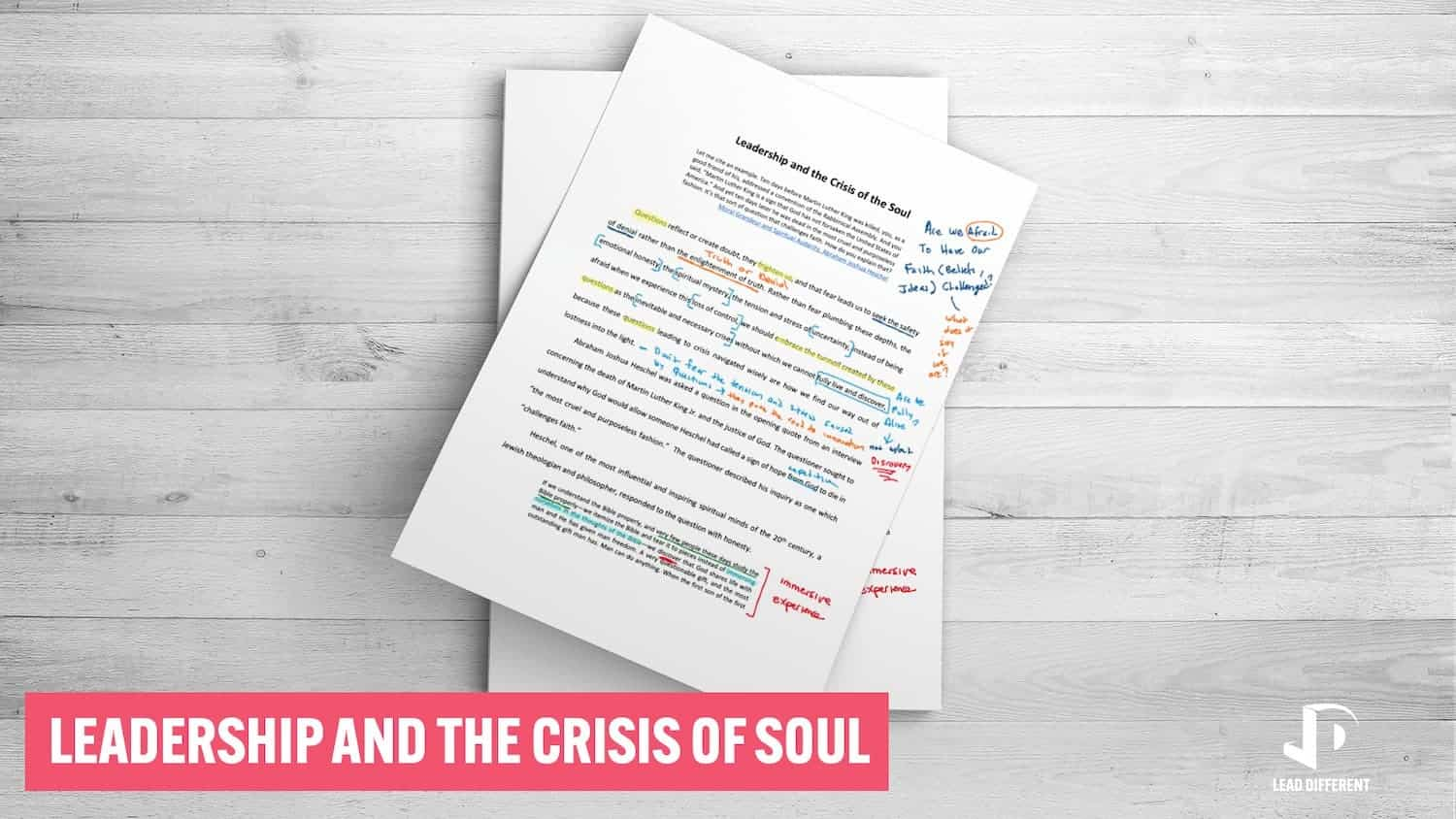
Leadership and the Crisis of the Soul
February 19, 2021
Russ Ewell
Let me cite an example. Ten days before Martin Luther King was killed, you, as a good friend of his, addressed a convention of the Rabbinical Assembly. And you said, “Martin Luther King is a sign that God has not forsaken the United States of America.” And yet ten days later he was dead in the most cruel and purposeless fashion. It’s that sort of question that challenges faith. How do you explain that?
Moral Grandeur and Spiritual Audacity, Interview with Abraham Joshua Heschel
Questions often reflect or create doubt. They frighten us, and that fear leads us to seek the safety of denial rather than the enlightenment of truth. We don’t have to fear plumbing the depths of emotional honesty, spiritual mystery, and the tension and stress of uncertainty. Instead of being afraid when we experience this loss of control, we should embrace the turmoil created by these questions as the inevitable and necessary crises without which we cannot fully live and discover. These questions help us navigate crisis wisely and are how we find our way out of lostness into the light.
Abraham Joshua Heschel was asked a question in the opening quote from an interview concerning the death of Martin Luther King Jr. and the justice of God. The questioner sought to understand why God would allow someone Heschel had called a sign of hope from God to die in “the most cruel and purposeless fashion.” The questioner described his inquiry as one which “challenges faith.”
Heschel, a Jewish theologian and philosopher who was one of the most influential and inspiring spiritual minds of the 20th century, responded to the question with honesty.
If we understand the Bible properly, and very few people these days study the Bible properly—we itemize the Bible and tear it to pieces instead of immersing ourselves in the thoughts of the Bible—we discover that God shares life with man and He has given man freedom. A very questionable gift, and the most outstanding gift man has. Man can do anything. When the first son of the first couple decided to murder his brother, he did what he pleased. And God did not interfere.
Moral Grandeur and Spiritual Audacity, Abraham Joshua Heschel
The honesty of Heschel’s answer would lead the questioner to ask more questions, which is what happens when we are entering or already in the midst of a crisis. It’s what David the King of Israel (1010-970 BCE) called a crisis of the soul.
I am radiant with joy because of your mercy, for you have listened to my troubles and have seen the crisis in my soul.
Psalm 31:7 TLB
For the last few months, I have been asking questions and without intention entered my own personal crisis of the soul. Perhaps it is circumstance – the coronavirus pandemic and the way it has disrupted life. However I think it is more likely that this crisis is a result of time, age, and the opportunity to examine my life with measured gaze, to catalogue failures and feel the pain of losses. But it is also the opportunity to transform steps made timid by this record of suffering into strides moving forward, hopeful of those elusive dreams I consider destiny – the life seen but not yet realized.
Perhaps you find yourself at a similar crossroads, where you are asking questions which bring the past into conflict with the present. In these moments, we find ourselves struggling to break free of yesterday’s entanglements, locked up by grief and overwhelmed by internal conflicts. We may find ourselves indecisive and hesitant because of the inadequacy we feel. And as a consequence of this imprisonment, we become incapable of seeing, let alone pursuing, the future. Even if it were possible, we believe ourselves unworthy of it.
Few can come to our assistance as well as Martin Luther King Jr. (MLK, Dr. King) when it comes to answering questions and navigating these crises of the soul. This is why I have chosen his leadership of the Montgomery Improvement Association (MIA) during the Montgomery Bus Boycott for us to study, understand, and reflect on his transformative moment, when he embraced his crisis of the soul and became the man destiny intended him to be.
The Lonely Paths of This Life
The obscene and threatening phone calls continued apace, and they took their toll. “I felt myself faltering and growing in fear,” King recalled later. Finally, on Friday night, January 27, the evening after his brief sojourn at the Montgomery jail, King’s crisis of confidence peaked. He returned home late after an MIA meeting. Coretta was asleep, and he was about to retire when the phone rang and yet another caller warned him that if he was going to leave Montgomery alive, he had better do so soon. King hung up and went to bed, but found himself unable to sleep. Restless and fearful, he went to the kitchen, made some coffee, and sat down at the table.
Bearing The Cross by David J. Garrow
The first time I heard Martin Luther King Jr. recall this death threat experience was during college. One of my rituals was to study in the music section of the library. They provided headphones which, when plugged into the desk console, allowed me to experience the serenity of musical solitude that most receive from Spotify and a smartphone today. And there was an additional benefit. On my study breaks I could listen to the complete collection of Martin Luther King speeches.
Dr. King is best known as the leader of the civil rights movement which changed America and the world. We know about the speeches and marches, the legal and political victories, but few of us know about the struggle. His soaring oratory, intellectual depth, political mastery, strategic execution, and visionary leadership make it easy to overlook the spirituality which put his prodigious talents to work, not only for rights of Black Americans, but on behalf of the downtrodden poor and economically disenfranchised as well.
The spirituality of Martin Luther King Jr. has little to do with his religious background, because being religious, where we adhere to the rituals and traditions of a particular religion, does not necessarily endow us with spiritual awareness or strength.
Spiritual awareness and strength grow out of struggle, those moments of crisis where we feel the conflict in our soul. They arise when, like Dr. King, we feel ourselves “faltering and growing in fear” as our once certain confidence evaporates, leaving us without answers, only questions. This moment arrived for Martin Luther King Jr. on the evening when he received that ‘obscene and threatening phone call’ that would test his commitment to the cause.
“I started thinking about many things,” he recalled eleven years later. He thought about the difficulties the MIA was facing, and the many threats he was receiving. “I was ready to give up,” he said later. “With my cup of coffee sitting untouched before me I tried to think of a way to move out of the picture without appearing a coward,” to surrender the leadership to someone else.
Bearing The Cross by David J. Garrow
Dr. King describes the type of pressure unique to leaders who actually lead, who fight for the causes and speak the truths that produce the type of difficulties, criticisms, and even threats which accompany those who seek to change the world. Once experienced, these pressures will lead anyone to consider giving up and surrendering leadership.
Whether we consider ourselves secular or religious, every person and leader will experience a “crisis of the soul.” Faced with the pain of difficulty, criticism, and threat, we will consider giving up and surrendering leadership. In some cases, we are broken by the experience and begin to question or consider abandoning even our most deeply held principles and beliefs.
These “broken moments” occur when our “inherited religion” (those values we received from parents, teachers, coaches, clergy, professors, mentors, or admired corporate leaders) is tested by suffering and adversity.
In these “broken moments,” these crises of the soul, we are forced to think for ourselves and decide what we really believe. This is exactly what Martin Luther King Jr. had to do on the eve of a critical moment in the civil rights movement when his choice would likely determine their success or failure.
“I didn’t have to worry about anything. I have a marvelous mother and father. They went out of their way to provide everything for their children… I went right on through school; I never had to drop out to work or anything. And you know, I was about to conclude that life had been wrapped up for me in a Christmas package.
Now of course I was religious, I grew up in the church. I’m the son of a preacher…my grandfather was a preacher, my great grandfather was a preacher, my only brother is a preacher, my daddy’s brother is a preacher, so I didn’t have much choice, I guess. But I had grown up in the church, and the church meant something very real to me, but it was a kind of inherited religion and I had never felt an experience with God in the way that you must, and have it, if you’re going to walk the lonely paths of this life.”
That night, for the first time in his life, King felt such an experience as he sought to escape the pressures the MIA presidency had placed upon him.
Bearing The Cross by David J. Garrow
Dr. King discovered what all who experience a crisis of the soul learn: no one can think for you, believe for you, be courageous for you, or defend you from the deepest fears and anxieties which inhabit the soul. This is why he describes leadership as a choice to “walk the lonely paths of this life.”
What follows are 7 discoveries about the way Dr. King allowed his crisis of the soul to transform his life. Follow them and we can do what he did, which was to in one night so deepen his spiritual awareness and strength that he found the capacity to hold on to rather than abandon his beliefs. Once certain about his beliefs, he was able to confidently assume the mantle of leadership not because it was convenient but because it was destiny.
1. Embrace Your Crisis of the Soul
But that night, unable to be at peace with himself, King feared he could take it no longer. It was the most important night of his life, the one he always would think back to in future years when the pressures again seemed to be too great.
Bearing The Cross by David J. Garrow
“King feared he could take it no longer” describes the prevailing emotional response of those who experience a crisis of the soul. We want to run, give up, get away, and do whatever it takes to ease the pain.
Rather than run away, we must each learn to run to our crises of the soul. This requires meeting our crises with the faith that our “anguish of the soul” (Psalm 6:3 NIV) will result in a transformation from the inside out, and that our necessary suffering (I Peter 1:6 NASB) will lead to the type of growth in character that produces spiritual awareness and strength (Romans 1:3-5 NLT).
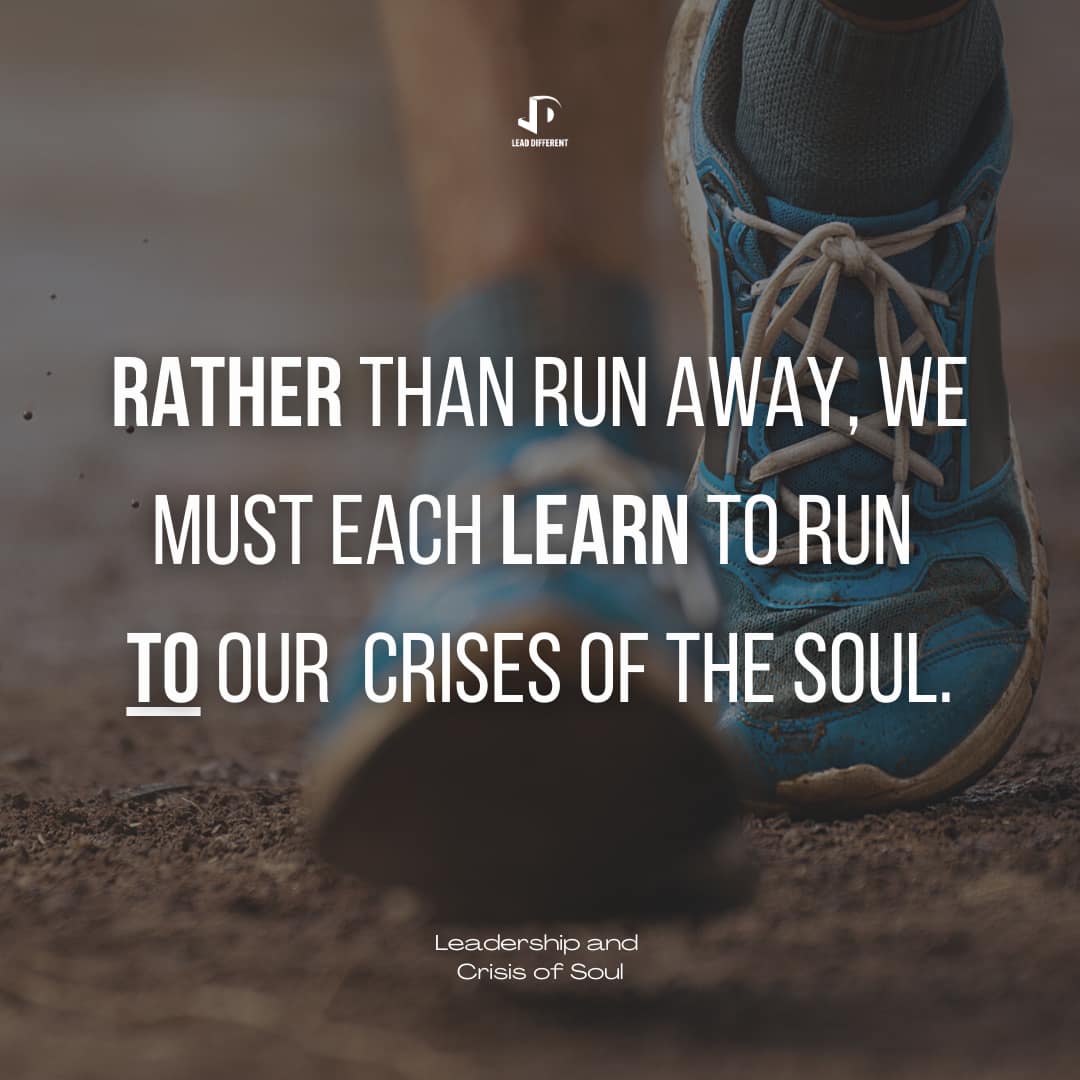
Allowing this process to complete its work (James 1:4 NIRV) will help us look back on our crisis of the soul in the same way Martin Luther King did as the most important experience of his life, “one he always would think back to in future years when the pressures again seemed too great.”
2. Don’t Be Afraid of Spiritual Experiences
“It was around midnight,” he said, thinking back on it. “You can have some strange experiences at midnight.” The threatening caller had rattled him deeply. “Nigger, we are tired of you and your mess now. And if you aren’t out of this town in three days, we’re going to blow your brains out, and blow up your house.”
Bearing The Cross by David J. Garrow
Crises of the soul are “strange experiences.” Life feels out of control. Stress increases as our heart, mind, body, and soul all experience the threats that rattle us emotionally, mentally, physically, and spiritually.
There is a threat matrix for each of the crises we can experience in life. Understanding these four crisis states can help us face them with courage in the knowledge that they are temporary. Though painful for the moment, once we emerge from them we are better than when we entered.
- Situational Crisis – the most common form of crisis is situational. We face a difficult or even impossible set of circumstances. Although we are usually unprepared, it is the experience which adds to our capacity to face future situational crises. Once we face circumstances beyond our control and capacity, we develop the ability to handle them in the future.
- Faith Crisis – this type of crisis is one which tests our most deeply held beliefs. Some examples of a crisis of faith have to do with loss – losing a loved one in their youth, which makes us question the goodness of God; divorce, which makes us question our capacity to be successful in any marriage relationship; and betrayal when someone we trusted deceives us, which makes us question whether we can ever trust another person. In short, a crisis of faith makes us question our belief in anything or anyone.
- Identity Crisis – there are at least three points in our lives when we are certain to experience an identity crisis. The first is during the untangling of our adolescent and teen years; the second during The Defining Decade of our twenties; the third being Mid-life, when we assess how things turned out and then draw conclusions about whether this is the life we hoped to live. These are the three most common stages of life where an identity crisis can be expected, each one asking the question, “Who am I and is this who I truly want to be?”
- Existential Crisis – even when we know who we are or who we want to be, there is a set of unasked questions which can plunge us into an existential crisis. The questions surfaced by this type of crisis ask about our existence (Matthew 16:26 NLT). Why do I want to be who I am? What is the purpose of my life? Why should I put myself through all of this to get whatever it is I am chasing? What will happen if I accomplish all I aim to accomplish but end up unhappy?
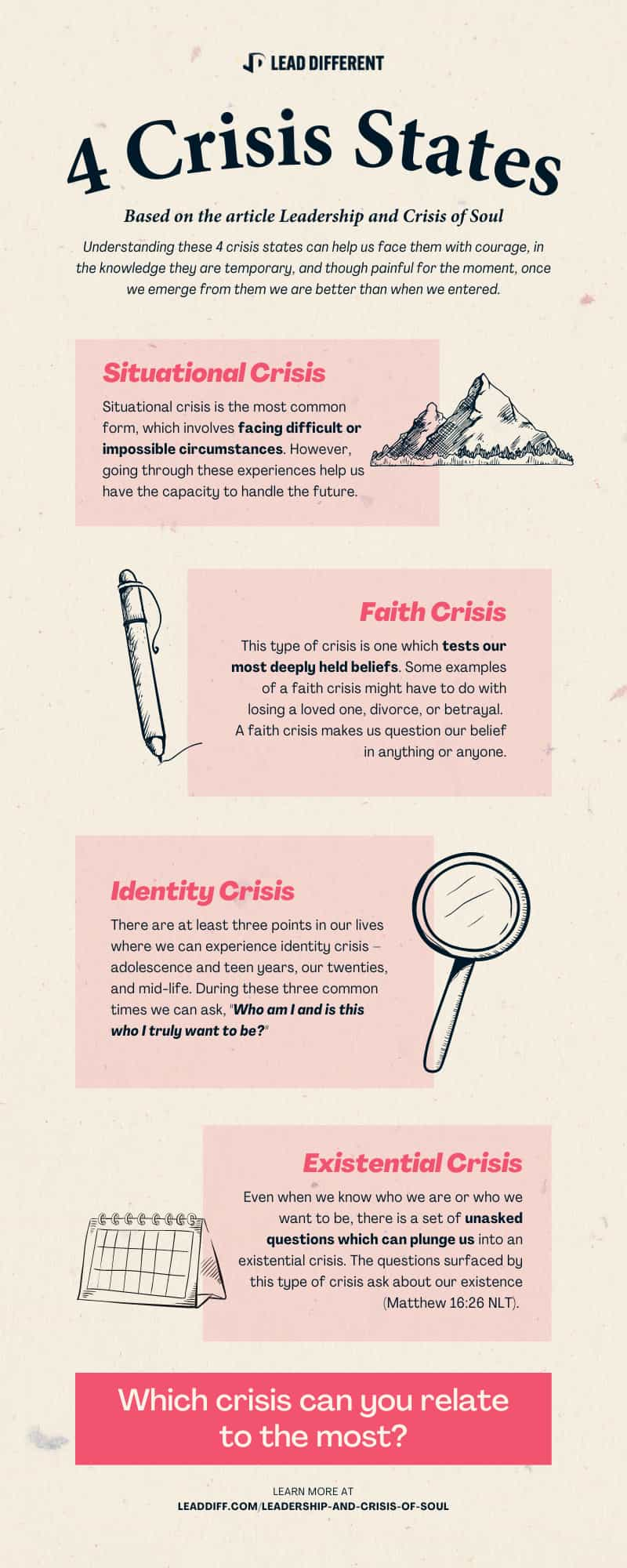
3. Know What Matters Most
I sat there and thought about a beautiful little daughter who had just been born.… She was the darling of my life. I’d come in night after night and see that little gentle smile. And I sat at that table thinking about that little girl and thinking about the fact that she could be taken away from me any minute. And I started thinking about a dedicated, devoted and loyal wife, who was over there asleep. And she could be taken from me, or I could be taken from her.
Bearing The Cross by David J. Garrow
Soul crises are about making decisions. The clarity necessary to make quality decisions is based on what is most important to us. In other words, we have to “know what matters most.”
As a father of children with disabilities, I was faced with a soul crisis early in their lives. The reality of this crisis became clear on a car ride. At the time, significant travel was part of my job description, and this car ride took place in one of the cities where I was invited to speak.
My reputation was as someone who resisted travel. This was because, as new parents, my wife and I were building something we had never seen built before, which was a family with disabilities.
Driving along, the leader who had invited me in to speak began to question my resistance to travel. He peppered me with questions aiming to unearth my motivations. The humorous part of the conversation was that each question he asked he then proceeded to answer, saying this same thing in a variety of ways: “All the rest of us travel and we are fine. What makes you different? Why are you so afraid?”
Until that moment of pressure to conform, defending my perspective never really occurred to me, so my response was extemporaneous. “We are both fairly young with young children. All of our co-workers have young families as well. How can you say you or they are fine? We won’t know what happens with our families until our kids have grown up. Only then will we know the effect of our presence or absence. I am betting on being present.”
In this moment, as we rode along, my words were motivated by the visual images of my family in my head. There was no question about what mattered most. My family was more important than travel because my family was more important than my job. Without my family, what value could I really bring to any job?
When we experience a soul crisis, we will be forced to decide what matters most, and that decision will echo in eternity.
4. Choose Confidence Over Insecurity
And I got to the point that I couldn’t take it any longer. I was weak. Something said to me, you can’t call on Daddy now, he’s up in Atlanta a hundred and seventy-five miles away. You can’t even call on Mama now. You’ve got to call on that something in that person that your Daddy used to tell you about, that power that can make a way out of no way.
Bearing The Cross by David J. Garrow
Once we know what matters most, we must begin to live our lives accordingly. In my case, this meant acting on the belief that building my family life in the right way would enhance every other endeavor I pursued.
Anyone who has made choices like this knows they require confidence, because insecurity cannot sustain a priority, principle, value, or conviction. The insecure are blown here and there by every wind of resistance (James 1:6 NIV), while those who are confident know how to navigate life in such a way that they turn the winds of resistance into the power that fills their sails as they travel on this ocean we call life (II Corinthians 5:7 AMP).
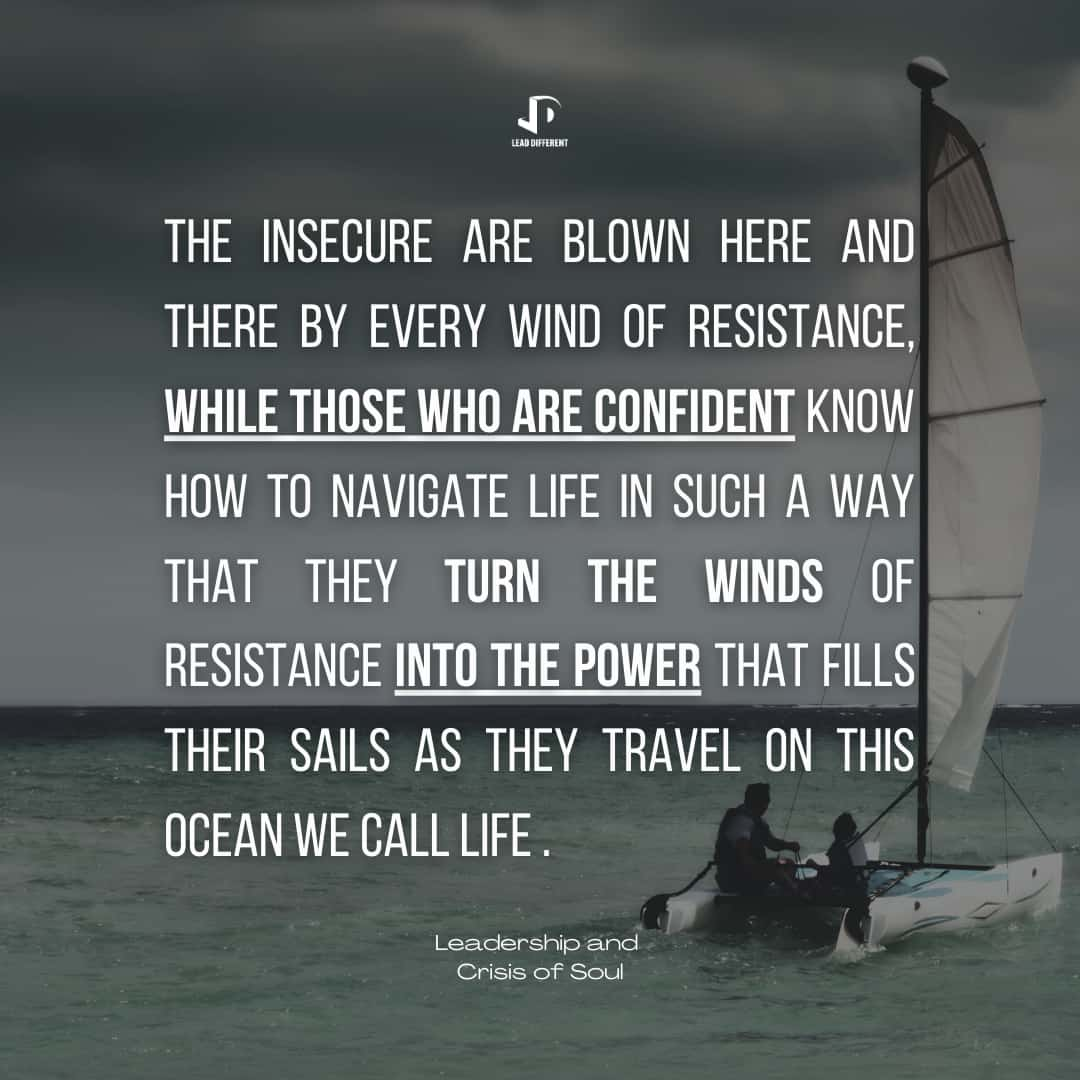
Choosing confidence over insecurity is more than developing a psychological capacity to process life without anxiety. It means finding a source of confidence invulnerable to the turbulence caused by the winds of life, whether that source be my choice of God or some other belief system uncompromised by the human weakness of self-reliance. Without this type of confidence, it will not matter if we know what matters most. We will never possess the internal strength to act on our convictions.
5. Let Vulnerability Do Its Work
And I discovered then that religion had to become real to me, and I had to know God for myself. And I bowed down over that cup of coffee. I never will forget it… I prayed a prayer, and I prayed out loud that night. I said, ‘Lord, I’m down here trying to do what’s right. I think I’m right. I think the cause that we represent is right. But Lord, I must confess that I’m weak now. I’m faltering. I’m losing my courage. And I can’t let the people see me like this because if they see me weak and losing my courage, they will begin to get weak.’
Bearing The Cross by David J. Garrow
Martin Luther King is underrated, because too little is known or discussed about his personal depth and life journey to become who he was meant to be. In truth, without his experience in Montgomery, he would never have discovered his potential. His discovery came through the vulnerability of expressing his emotions, those feelings of weakness and inadequacy which were causing him to lose his courage.
What can we learn from MLK? Simply this, vulnerability is not weakness, but an essential part of the process necessary to develop the spiritual awareness and strength to become the person we are meant to be.
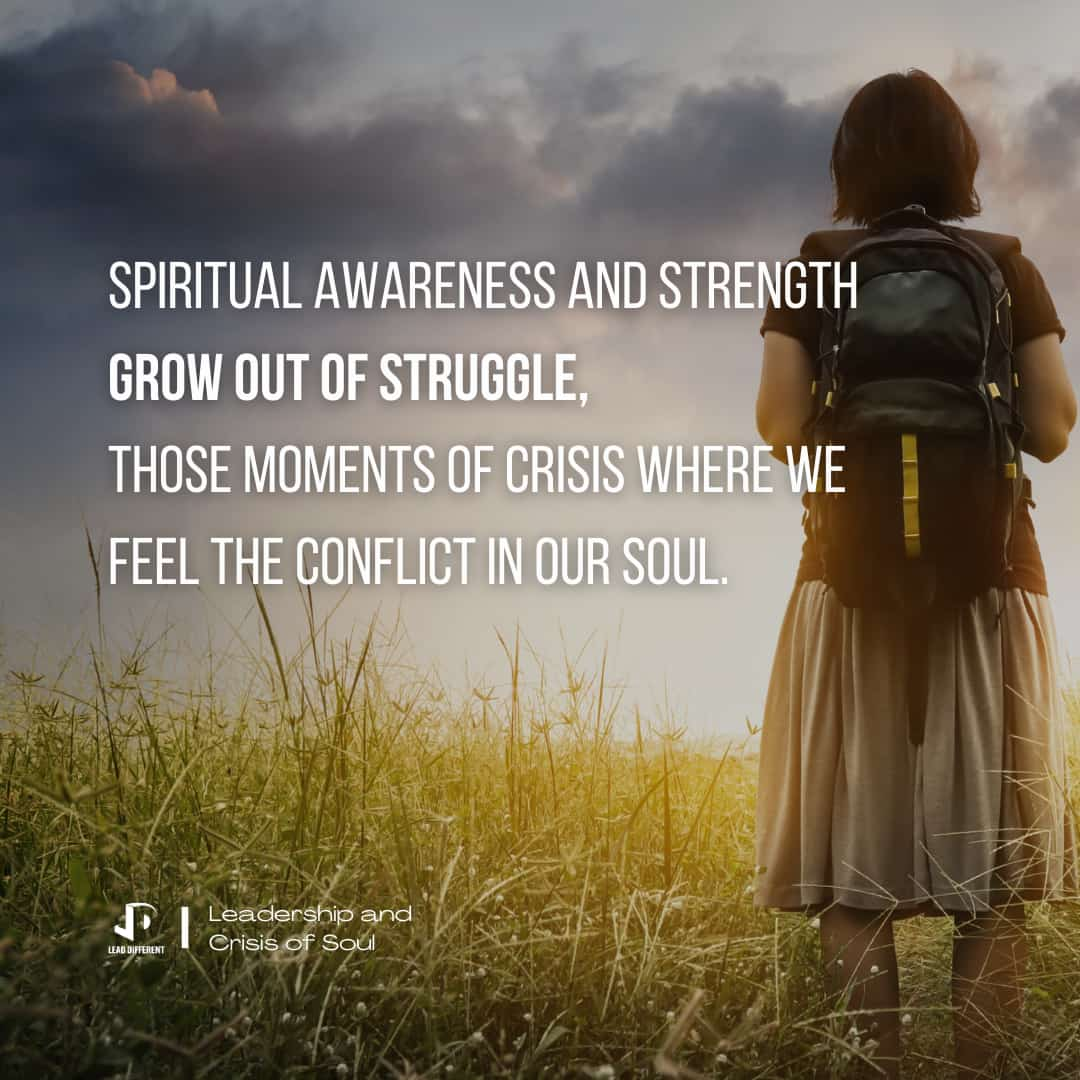
Brené Brown, one of the foremost authorities on vulnerability, has this to say on the topic:
Vulnerability isn’t good or bad: It’s not what we call a dark emotion, nor is it always a light, positive experience. Vulnerability is the core of all emotions and feelings. To feel is to be vulnerable. To believe vulnerability is weakness is to believe that feeling is weakness. To foreclose on our emotional life out of a fear that the costs will be too high is to walk away from the very thing that gives purpose and meaning to living.
Daring Greatly, Brené Brown
My attitude toward vulnerability in my earliest years (including my twenties and early thirties) is best described by the words of Brené Brown who said, “Armoring up before a vulnerable experience is attractive to me.”
“Armoring up” is going on the defense, something I did because I was “emotion-phobic,” another Brown concept. I didn’t believe emotions solved problems. In fact, it was my position that emotions simply caused pain.
Since breaking free from the misconception that vulnerability is weakness, my thinking has become less rigid, my conversations less defensive, and my resistance to personal growth and change decreased. As a result, like Martin Luther King, I have begun to discover a level of spiritual awareness and strength I never knew was possible.
How do you feel about vulnerability? Who are the people with whom you have a vulnerable relationship? Would you describe yourself as “emotion-phobic” or someone who “armors up”? Now what can you do to let vulnerability do its work?
6. Find Your Inner Voice
Then it happened: And it seemed at that moment that I could hear an inner voice saying to me, ‘Martin Luther, stand up for righteousness. Stand up for justice. Stand up for truth. And lo I will be with you, even until the end of the world.’… I heard the voice of Jesus saying still to fight on. He promised never to leave me, never to leave me alone. No never alone. No never alone. He promised never to leave me, never to leave me alone.
Bearing The Cross by David J. Garrow
The more we lean into our soul crisis, the closer we will get to developing our inner voice, which gives us the capacity to know and communicate “who we are” and “why we are here.”
One of my favorite posts on Lead Different was on lessons we can learn from Bruce Springsteen about discovering our voice. Whether you like Springsteen or not, his journey is a detailed description of what Martin Luther King describes above and you can read it here.
7. Run Toward Your Destiny
That experience gave King a new strength and courage. “Almost at once my fears began to go. My uncertainty disappeared.” He went back to bed no longer worried about the threats of bombings. The next morning he went down to the Montgomery courthouse and was convicted of the Thursday speeding charge. He was fined $10, plus $4 in court costs. Fred Gray filed notice of appeal.
Bearing The Cross by David J. Garrow
Martin Luther King emerged from his soul crisis with “new strength and courage” as his “fears began to go” and his “uncertainty disappeared,” then “no longer worried about the threats of bombings” as he ran toward his destiny. What is particularly daunting is that it meant going to court and being convicted, something that was just the beginning of the suffering and injustice he would face on the way to changing the world.
It is unlikely we will face jail and assassination like Martin Luther King, so it should be that much easier for us to run toward our destiny and to let go so we can grow to be the person we know in our hearts we should be. This process of letting go is exactly what it means to embrace our soul crisis so we can develop the spiritual awareness and strength to pursue and fulfill the destiny to which we have been called.
Conclusion
We must see each crisis in our lives as a moment of decision, a chance to change course, renew, reinvent, and rebuild, because while crisis is defined by Oxford Dictionary as a time of “intense difficulty, trouble, or danger,” it is also described as a turning point “when a difficult or important decision must be made.” In fact, the Greek word for crisis means “a decision.”
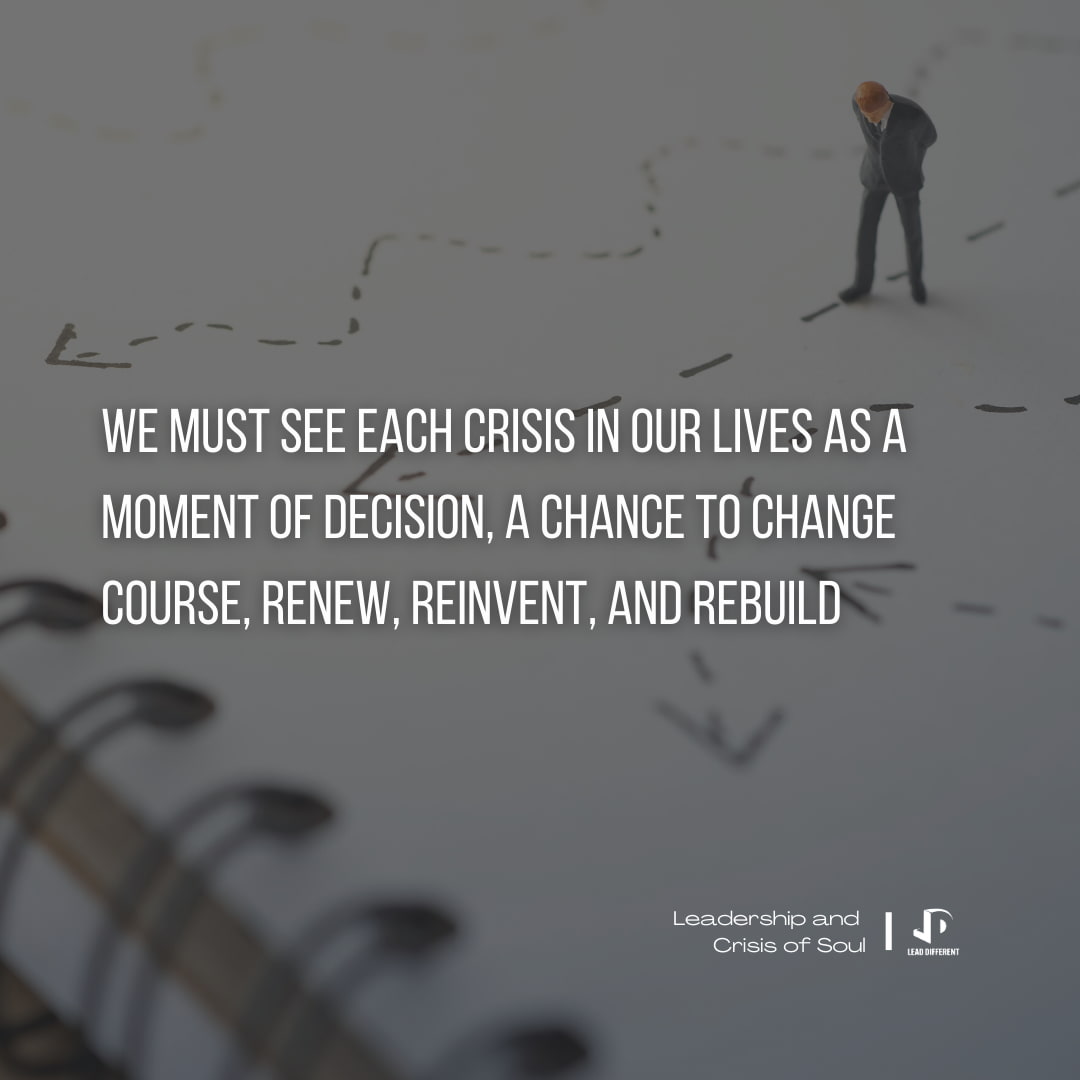
As this pandemic begins to slowly resolve itself, each one of us has the opportunity, like Dr. King, to address the crises in our lives and fulfill the scripture which best describes his triumph over fear:
“I am radiant with joy because of your mercy, for you have listened to my troubles and have seen the crisis in my soul.”
Psalm 31:7 (TLB)
My Leadership Notebook
The following are my handwritten notes illustrating my thoughts and ideas still in development. I’d like to give you a window into my thought process each week, in hopes that it will inspire you to unleash your own creativity and embrace imperfection. You can download them here.
